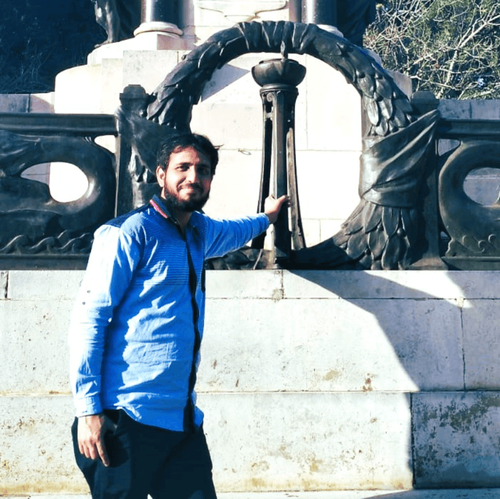Debprasad Dutta

Debprasad Dutta (aka Dr. Deb) is a Research Scientist at the Mazumdar Shaw Medical Foundation (MSMF) in Bangalore, India. Current focus of translational cerebrovascular research.
He holds a PhD from the National Institute of Mental Health & Neurosciences (NIMHANS). His doctoral work focused on neuroimmunogenetics. Beyond science, he is interested in poetry and public outreach on neurodisciplines.
Debprasad Dutta, often referred to as Dr. Deb, is an Indian translational neuroscientist and research scientist currently affiliated with the Mazumdar Shaw Center for Translational Research (MSCTR) under the Mazumdar Shaw Medical Foundation (MSMF) in Bangalore, India. His work is conducted in collaboration with the Narayana Institute of Neurosciences (NIN), Narayana Health, where he engages in translational neuroscience research aimed at bridging laboratory findings with clinical applications.
Dutta’s current research focuses on two major flagship moonshots funded by the SKAN Research Trust: the “HASP (Heart Attack and Stroke Predictability) Tool” program (2024–present), which aims to develop a predictive model for stroke and heart attack risk, and the “Stem Cell-Based Neurological Disorder Management” program (2023–present), a multi-center study exploring the neuroreparative potential of mesenchymal stem cells (hMSCs) combined with hyperbaric oxygen therapy (HBO) for stroke recovery In this capacity, he has established a Biosafety Level 2 (BSL2) facility for neural cell culture and leads the Integrated Research on Neuroscience (IRoN) lab for conducting bioexperiments.
He earned his Doctor of Philosophy (PhD) in Human Genetics from the National Institute of Mental Health and Neurosciences (NIMHANS), an Institute of National Importance in India, with research supported by the Indian Council of Medical Research (ICMR). His doctoral work centered on the neuroimmunogenetic profiling of Guillain-Barré syndrome (GBS), a post-infectious autoimmune neuropathy. This research was conducted under a split-site Commonwealth Scholarship, which enabled him to spend time at the Institute of Infection and Global Health at the University of Liverpool, UK, working with Professor Tom Solomon. His PhD investigations revealed immunogenetic risk factors in GBS, including variations in Toll-like receptor (TLR) genes and altered Th17 pathway signatures in both serum and cerebrospinal fluid of patients.
Dutta has contributed to several peer-reviewed publications on GBS, including studies on antecedent infections, ganglioside and ganglioside complex antibodies, and cytokine profiles indicating multi-lineage T-helper responses. Notably, he co-authored a 2022 study published in the “Journal of the Peripheral Nervous System” that analyzed synergistic effects of TLR-related gene variations on GBS susceptibility. He also contributed to research assessing the impact of prior infections on autoantibody production in GBS patients.
In addition to his work on neuropathies, Dutta has published on broader public health topics, including a 2021 review titled “Revisiting Antibiotic Resistance: Mechanistic Foundations to Evolutionary Outlook” in the journal “Antibiotics”. He also co-authored a 2023 meta-analysis on the comparative immunogenicity, safety, and efficacy of four types of COVID-19 vaccines in healthy adults, published as a preprint on medRxiv. He has contributed chapters to academic books, including “Principles and Clinical Interventions in Social Cognition” (2024), where he explored intersections between cognitive connectomics and sociomics.
Dutta has received several prestigious awards and recognitions, including the Commonwealth Scholarship (UK), the Developing Country Award from the American Society of Human Genetics (ASHG), the AWSAR (Augmenting Writing Skills for Articulating Research) Award from the Department of Science and Technology (DST), India, and the ICGEB Best Talk Honor (Sri Lanka). He also was awarded the Junior Research Fellowship cum Assistant Professorship from the University Grants Commission (UGC)-India and served as a Senior Research Fellow at ICMR.
He is actively involved in scientific peer review, having served as an invited reviewer for journals such as “BMC Neurology”, “Nature Scientific Reports”, “Physiological Genomics”, and “Cureus”. Recently, he joined the editorial board of “Frontiers in Neurology”. His professional memberships include the American Peripheral Nerve Society (APNS), British Peripheral Nerve Society (BPNS), American Society for Human Genetics (ASHG), Federation of European Neuroscience Societies (FENS), and the Royal Society of Biology (UK), among others.
Beyond research, Dutta is committed to science communication and public outreach. He has presented on evolutionary neuroscience at National Science Day events and serves as a Commonwealth Mentor and Advisor for the Action Potential Advising Program (APAP). He has also authored popular science articles and poetry, reflecting his interdisciplinary interests. He created a short film titled “The Lost Reflex”, which explores the science and human impact of Guillain-Barré syndrome.
Dutta holds a Bachelor of Science from Burdwan Raj College and a Master of Science in Zoology from the University of Burdwan, West Bengal, before pursuing his doctoral studies in Bangalore. He maintains an active netizen community participation through platforms such as LinkedIn, Twitter (@DuttaDebprasad), ORCID (0000-0001-5698-3067), and personal websites where he shares scientific insights and creative writing.
Interests
At MSCTR, he is involved in stem cell therapy development for neurological disorders with Narayana Health and participates in projects funded by SKAN Research Trust. His research interests include cell-based regeneration for stroke damage and biomarkers for stroke susceptibility.